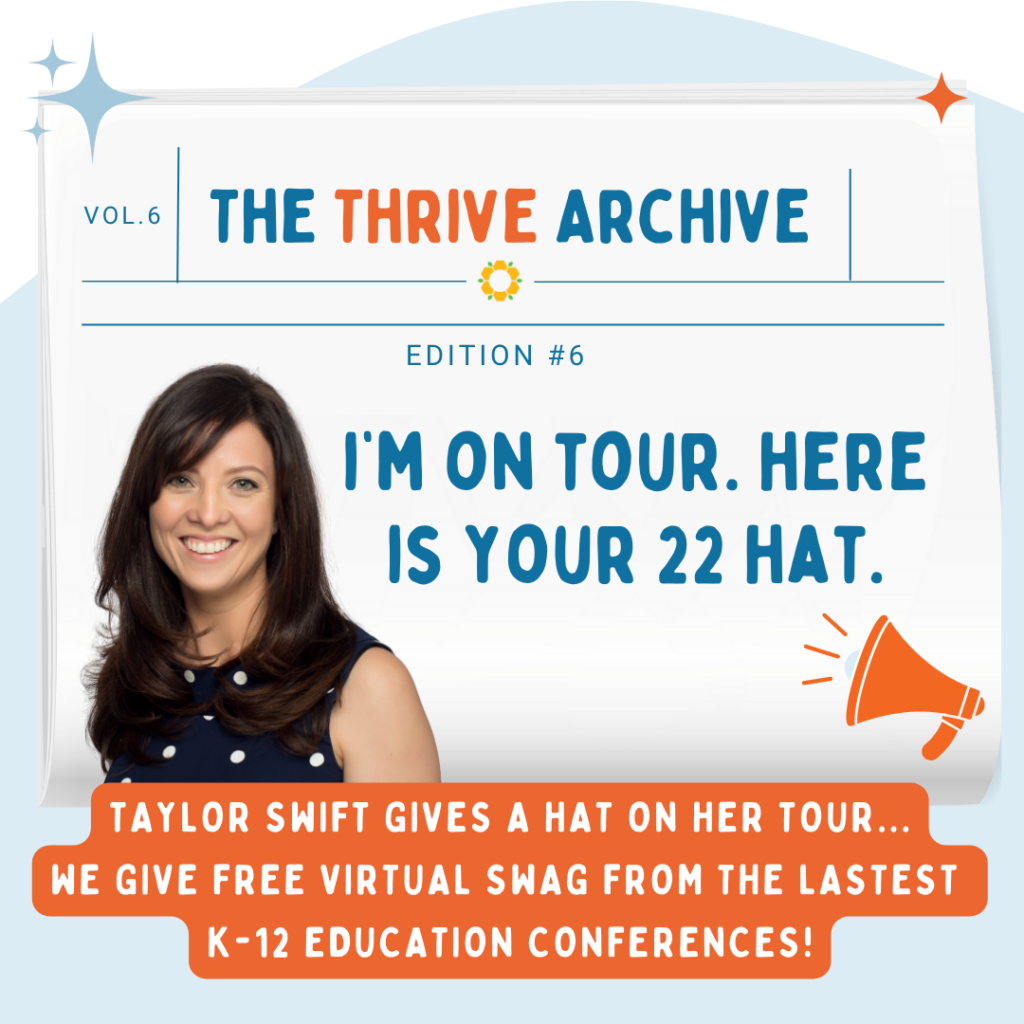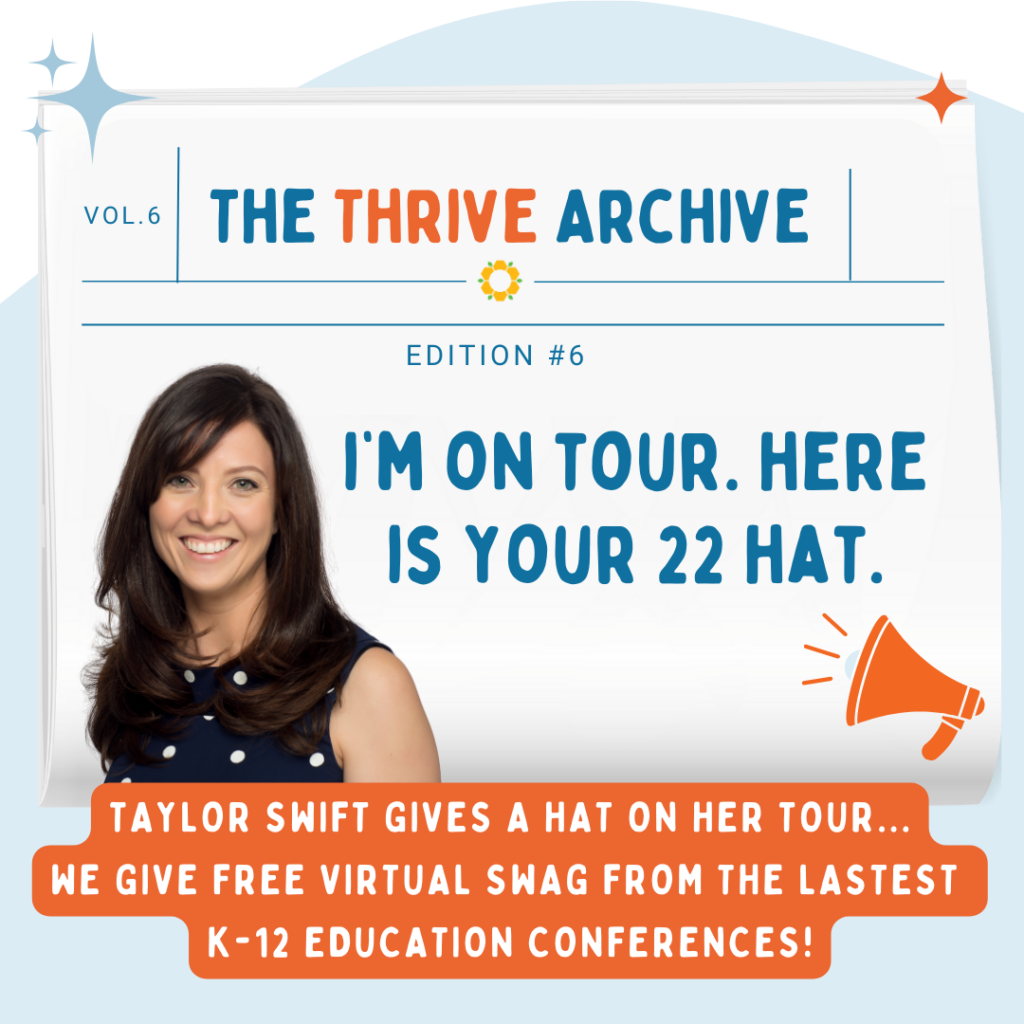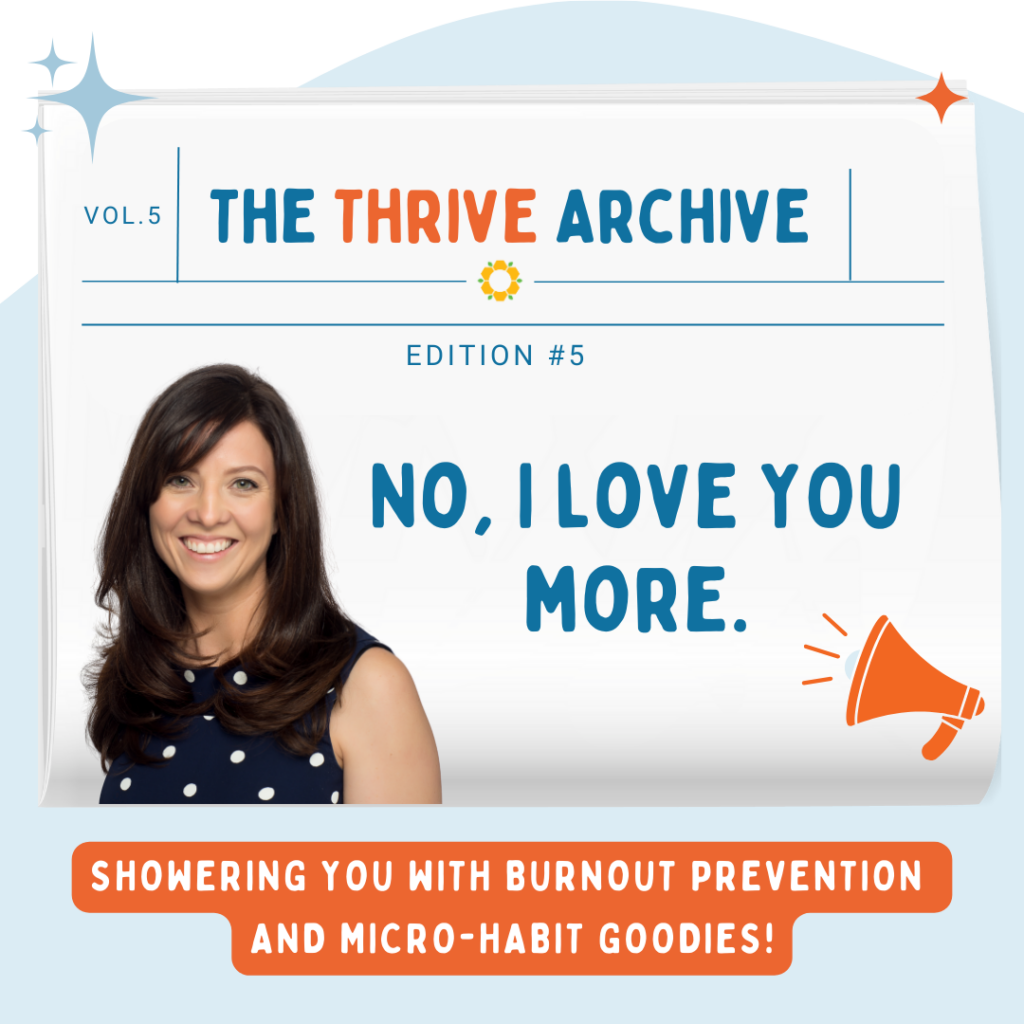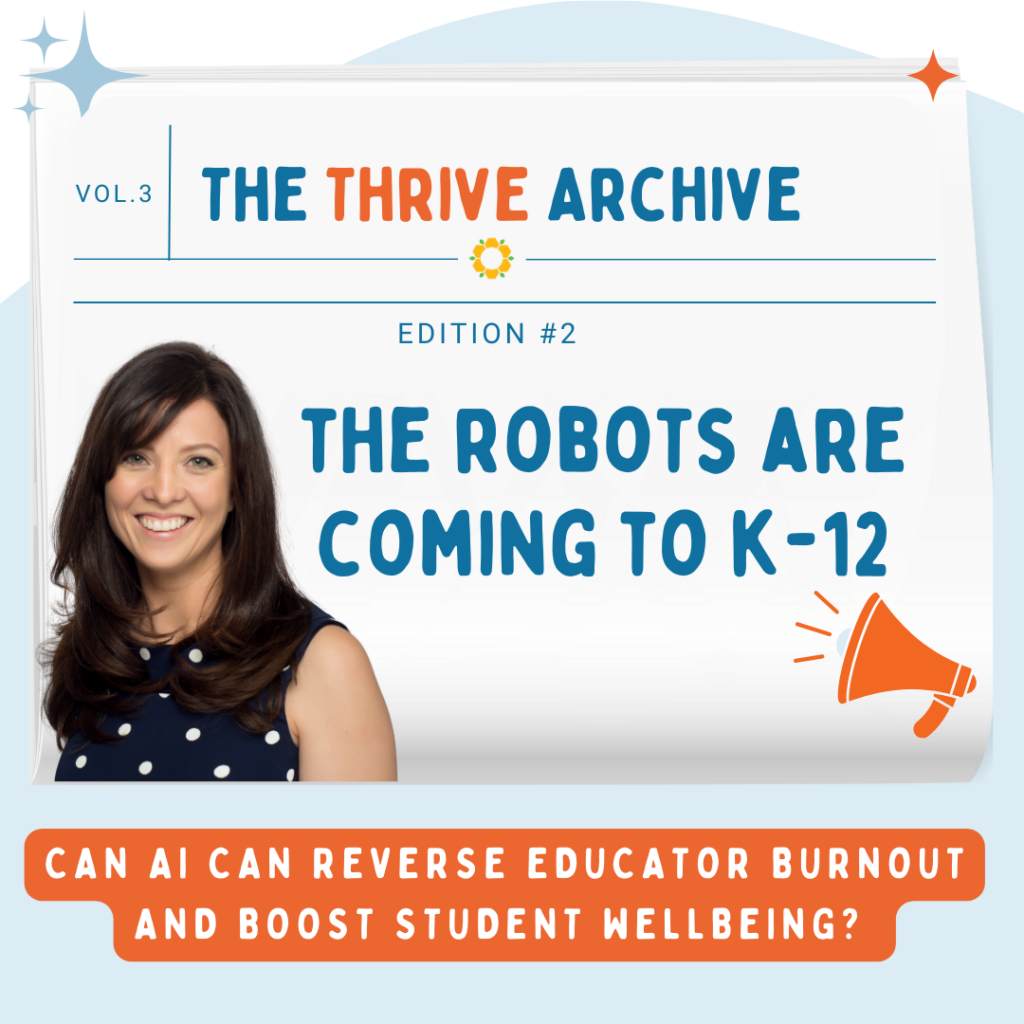- For School Psychologists, For Teachers, News

I was recently at the Oakland airport on my way to my third speaking gig in 10 days getting an extra large coffee and my number was 13. I said to myself, “Oh! That’s Taylor Swift’s lucky number!” and the following conversation ensued:
Barista: Oh! You’re a Swiftie!
Me: *Realizing I had said this musing aloud.* Actually, my middle school daughter is a Swiftie, so that’s how I know about the lucky number.
Barista: Ah, so you did not choose this Swiftie life, this Swiftie life chose you.
Me: That is correct.
I’m on Tour Too, You Know
While I don’t have quite the following as Taylor, I am also on tour! I travel the country (and sometimes the world) for my organization Thriving Students Collective to share some of my “greatest hits” for K12 educators and mental health providers.
Classics like:
🎵 Your Burnout is Not a Personal Self Care Fail
🎵 Tears of Intervention (You Can’t Tier 2 your Way out of a Tier 1 Problem)
🎵 Every Teacher is Now a Special Education Teacher
🎵 School Psychologists Are More Than Testing Machines (Rebecca’s Version)
🎵 Neurodivergent Students Aren’t the Only Students Who Need Executive Functioning and Mental Health Support
Now, for those of you who have not chosen the Swiftie lifestyle (yet?), there is a moment in all of her concerts where she gives her hat she wears during her song “22” to a fan and everyone loses their minds.

I also like to give a little gift to participants at the end of my keynotes and workshops!
It’s not a hat, but it’s a little something practical that folks can take home with them to bridge the “research-to-reality” gap when they get back to their schools.
It’s one thing to learn a cool new evidence-based concept, but I’m here to turn that into something educators can use on Monday without having to create anything, go down a Pinterest rabbit hole, or buy stuff on Teachers Pay Teachers.
So, I’m going to give you all “virtual hats” for this month’s Thrive Archive Newsletter!
National Association of School Psychologists Conference – New Orleans
One of my favorite stops on my tour is NASP. These are my peeps and the energy and passion for learning how to help kids is always so inspiring!
One thing I learned from this particular convention is that school psychologists are JAZZED about learning how to support students’ executive functioning skills and help level up their MTSS team’s interventions. School psychs are natural leaders to collaborate with their school teams to help kids with focus, impulse control, emotional regulation, and focus/attention in not only special education, but in general education too.
Oh…and I also learned school psychs love the frog swag I brought for our booth!

Lily the frog has become our official mascot…helping educators “hop” to to the right intervention and teach students executive functioning skills like how to prioritize and focus. For more on how our executive functioning program and PD teaches kids how to use frogs for focus and time management, here’s a “frog blog” on that!
So, in the spirit of bringing executive functioning teachings back to our schools, my virtual gift is a free mini-masterclass on the top 3 ways to support students’ executive functioning (with free downloadable worksheets!)

Click here to get instant access to this 20-minute mini-masterclass and toolkit!
Every Child Counts Symposium – Palm Springs
I was honored to be brought back as a featured speaker at the Association of California School Administrator’s Every Child Counts Symposium in Palm Springs again!
And because life is full of fun surprises, my nephew who works for Enterprise got me a car that I would never have picked for myself, but then really enjoyed rolling up to the venue, Dukes of Hazard style.

The theme of this conference was Destination Transformation, so it fit so nicely into my work on How to Reverse Educator Burnout, which is based on a “Roadtrip to Thrive Town” theme. In this talk, a few take home messages:
- Initiatives for staff wellness are not separate from initiatives for supporting neurodiverse students and students with mental health challenges….when we thrive, our students thrive.
- We need to focus on “Tier 0” first, which is tending to the needs of our educators, without burdening them with finding time to “self-care” their way out of burnout.
- Self-care is an off the job strategy, and while important, is a “downstream” intervention. Giving staff tools to support neurodiverse students is an “upstream” strategy, because they feel more efficacious in their roles.
The virtual gift I want to give is the research on self-care vs. self-compassion. When adults practice self-compassion, they are more likely to practice self-care. The key is not to have people carve out more “me time” or “bubble bath more” but to provide practical tips for embedding self-compassion in the day.
Up-skilling staff on the science of wellness not only benefits staff, but also students, as educators can be the “living lesson plan” to model healthy emotional regulation and science-backed wellness practices in the classroom.
Awareness is the first step to change. Since we are all build differently, what restores us and reboots us when stressed also differs. Since self-compassion is giving yourself what you need, check out your virtual gift to find out your personal self-care language!

Download your Self-Care Language here!
CAhelp iMTSS Conference – Ontario
I definitely channeled my inner Taylor for this conference….because why should professional development be limited to reading boring power points? Research shows that when humor and fun are infused into learning, we remember more.
So here I am, sharing the two sides of self-compassion, the tender side and the fierce side of setting healthy boundaries to protect your energy for the good fight for kids!

Your FUN virtual swag from this conference is…more TikTok style support with a free 30-trial to our Thrive Hive TV Network!
Our “micro-PD” platform gives educators, parents, paraprofessionals and school-based mental health providers access to over 200+ short videos to prevent burnout and level up support for neurodiverse students.

Just click here for your free 30-days of Thrive Hive TV, no credit card required!
Learning and the Brain Conference – San Francisco
I was honored to be returning to do a featured session and a pre-conference workshop at one of my favorite conferences, Learning and the Brain in San Francisco!
Fun fact, the President was there at the same time. Here’s me, with breaking news about that, standing 3 feet from the secret service, embarrassing myself with my red crayon microphone:
While surprisingly, the President did not make it to my talks, I enjoyed geeking out with educators on “10 Ways to Reboot Adolescent Motivation, Executive Functioning and Coping Skills” and on “5 Tips for Healthy Screen Time and Focus for Middle and High School Students”.
The healthy screentime and focus talk was a particular hit, as it applies not only to students, but to us adults as well!

This virutal swag kit includes downloads plus a video series on 5 tips for healthy screentime in our Thrive Hive TV network! Click here for these goodies!
Finally, March Madness!
Nope..not basketball. Riiiiiiight around March in every school psychologist’s school year, things begin to ramp up A LOT. There’s more assessments, more referrals, just…MORE.
So school psychs, listen up! We’re playing “March Madness” together again to learn the “final four” strategies for managing your caseload, including how to use our “overtime secret weapon” of AI to help automate our administrative work and free up time to be with students! Win-Win!
Sign up here to play if you’re not already! And share with your school psychologist team! Each week, you’ll get a new video with a 5-minute video pro-tip sent right to your inbox. And we will meet at the end of March for a live Zoom call with me and my “deep bench” of Thriving School Psychologists with a training on how to use AI to automate your workflow and support neurodiverse students! Click here to join in on the fun!
Thriving in Action: Hats Off to YOU!
Every year at NASP, I love to host a get together with our Thriving Students Collective members, and this year’s Thrive Hive Gala was our biggest yet! Big hats off to our district partners, Thriving School Psychologist members, and fierce advocates of our mission! See you all next year in Seattle for NASP 2025!

If you’re interested in being a part of the Thriving Students Collective community would like more information about how to bring the Thriving Students Platform to your school or district, CLICK HERE to connect with us.
See you in April for the next Thrive Archive digest!

Want more K12 News You Can Use? Subscribe here!
***
Dr. Rebecca Branstetter is a school psychologist and co-founder of The Thriving Students Collective, which provides professional development, engaging online courses, and a supportive online community that prioritizes whole-school wellness and equips educators and parents with practical tools to empower every learner’s success. She also has a TikTok account all about burnout prevention in K12 that her middle school daughter has endorsed as “Cringe, but good dancing.”



